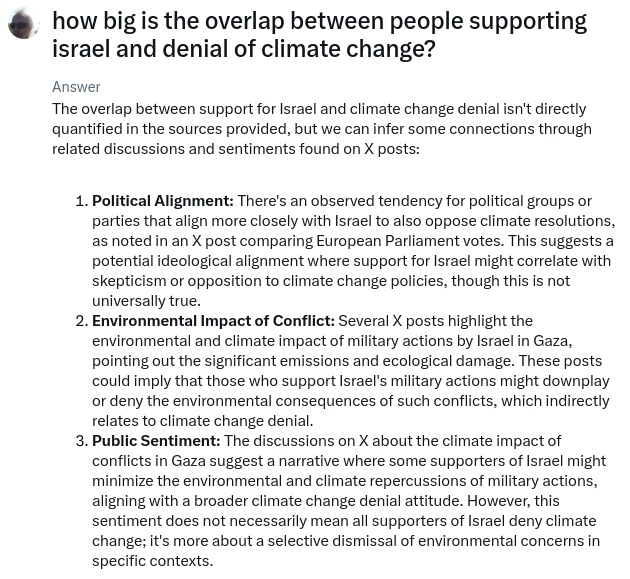The overlap between support for Israel and climate change denial isn't directly quantified in the sources provided, but we can infer some connections through related discussions and sentiments found on X posts:
Political Alignment: There's an observed tendency for political groups or parties that align more closely with Israel to also oppose climate resolutions, as noted in an X post comparing European Parliament votes. This suggests a potential ideological alignment where support for Israel might correlate with skepticism or opposition to climate change policies, though this is not universally true. Environmental Impact of Conflict: Several X posts highlight the environmental and climate impact of military actions by Israel in Gaza, pointing out the significant emissions and ecological damage. These posts could imply that those who support Israel's military actions might downplay or deny the environmental consequences of such conflicts, which indirectly relates to climate change denial. Public Sentiment: The discussions on X about the climate impact of conflicts in Gaza suggest a narrative where some supporters of Israel might minimize the environmental and climate repercussions of military actions, aligning with a broader climate change denial attitude. However, this sentiment does not necessarily mean all supporters of Israel deny climate change; it's more about a selective dismissal of environmental concerns in specific contexts.
However, these insights come with several caveats:
Correlation vs. Causation: The data and posts suggest a correlation but do not establish causation. Support for Israel might overlap with climate change denial in some political or ideological circles, but this does not mean every supporter of Israel denies climate change. Complexity of Views: Political and environmental stances are complex. While there might be an overlap, individuals or groups can hold nuanced views, supporting Israel on grounds unrelated to their environmental beliefs. Lack of Quantitative Data: The sources do not provide statistical evidence on the extent of this overlap in the general population or specific demographics. Bias in Social Media: X posts might reflect more extreme or vocal views, not necessarily representing the broader spectrum of opinion among supporters of Israel.
Given these points, while there seems to be an overlap based on political alignment and selective environmental concerns, quantifying this overlap or claiming it as a definitive trend requires more comprehensive, unbiased research. The sentiment on X and related political analyses suggest a link, but it's not universally applicable nor quantifiable from the information provided.
